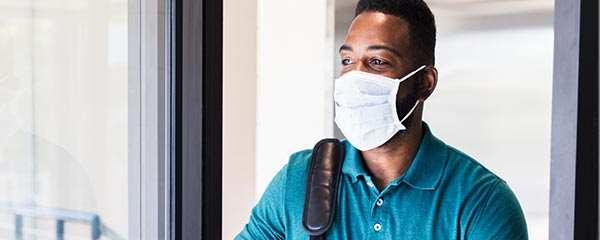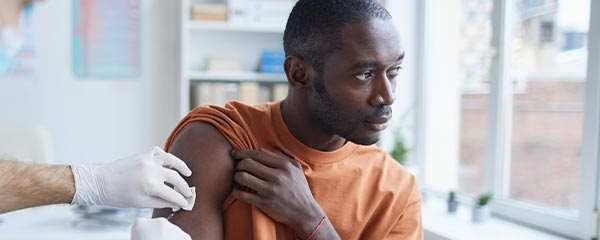Story Highlights
- Percentage "very confident" they can avoid infection drops in July
- Nearly two-thirds worried about variants spreading; three in 10 "very worried"
- Vaccine resisters are the exception, with fewer than one in five worried
WASHINGTON, D.C. -- With the delta variant driving COVID-19 infection rates back up in July, Americans have become less confident that they can protect themselves when in public from catching the coronavirus. The percentage who are "very confident" fell to 38% at the end of the month, after rising to a pandemic high of 51% in May and remaining near that level, at 50%, in June. For most of last year, fewer than one in four Americans were very confident they could protect themselves.

Line graph. Trend from March 2020 to July 2021 in percentage of Americans who are very confident that they can protect themselves when out in public from being infected by the coronavirus. Percentage was at its lowest, 10%, in March 2020. It rose to 28% by June of that year before declining to 19% in the fall. It rose back to 26% in January 2021, 35% in March and 51% in May. It stayed at 50% in June before falling to 38% in July.
Another 52% of adults now feel "somewhat confident" they can protect themselves in public from the coronavirus, and 10% are "not too" or "not at all" confident.
These findings are from Â鶹´«Ã½AV's July 19-26 update of its monthly COVID-19 tracking study, conducted by web using the nationally representative Â鶹´«Ã½AV Panel. Since the poll was completed, the Centers for Disease Control and Prevention has intensified its warnings about the dangers the delta variant poses and has recommended that vaccinated people wear face masks in certain areas. New research also indicates that the variant is as contagious as chickenpox and the common cold, and that vaccinated people who are sickened by it are as likely as unvaccinated people to spread it.
Most Unvaccinated Adults Not Worried About COVID-19 Variants
The dip in Americans' certainty that they can protect themselves from COVID-19 coincides with almost two-thirds of national adults expressing concern about the spread of new coronavirus strains or variants. The delta situation is worsening rapidly, but at the time of the survey, 31% were very worried about new strains spreading, and 33% were moderately worried.
Worry about community spread is substantially higher among fully vaccinated adults (78% are very or moderately worried) and those who plan to get vaccinated (77%) than it is among adults who do not plan to get vaccinated (19%). Still, fewer than half of fully vaccinated adults (39%) are very worried about the coronavirus strains.
| Very worried |
Moderately worried |
Not too worried |
Not worried at all |
|
|---|---|---|---|---|
| % | % | % | % | |
| U.S. adults | 31 | 33 | 16 | 20 |
| Vaccination status | ||||
| Fully vaccinated | 39 | 39 | 13 | 9 |
| Plan to get vaccinated | 37 | 40 | 14 | 10 |
| Don't plan to get vaccinated | 5 | 14 | 26 | 55 |
| Â鶹´«Ã½AV Panel, July 19-26, 2021 | ||||
As of the late July survey, 68% of Americans aged 18 and older reported being fully vaccinated, 8% said they plan to be vaccinated and 23% did not plan to be vaccinated. An additional 1% (too few for reliable estimates of their views to be reported) said they are partially vaccinated.
Along with their increased worry about new coronavirus strains, Americans were also a bit more worried in July about people choosing not to get vaccinated -- 60% were very or moderately worried, up from 53% in May. And, after five months of steady decline, the percentage worried about the availability of hospital supplies, services and treatment in their local area ticked up to 16%, from 11% in May. The rate was 51% in December.
Subdued Confidence That Vaccines Offer Protection From Variants
Just 14% of adults are very confident that the existing COVID-19 vaccines will protect people from newer variants of the virus, likely reflecting recent reports that some vaccinated adults are being sickened by a milder form of COVID-19 from the delta variant, which was first detected in India. Another 57% of adults are moderately confident about this, while 29% are not too or not at all confident.
Confidence in the protection offered by COVID-19 vaccines is much higher among vaccinated Americans than among those with no intention of being vaccinated. Nearly nine in 10 adults who are fully vaccinated (87%) feel very or moderately confident that COVID-19 vaccines will provide protection from the variants. The large majority of those who plan to be vaccinated also believe this (74%), versus just 21% of those who don't plan to be vaccinated.
| Very confident |
Moderately confident |
Not too confident |
Not confident at all |
|
|---|---|---|---|---|
| % | % | % | % | |
| U.S. adults | 14 | 57 | 17 | 12 |
| Vaccination status | ||||
| Fully vaccinated | 17 | 70 | 11 | 2 |
| Plan to get vaccinated | 13 | 61 | 23 | 4 |
| Don't plan to get vaccinated | 5 | 16 | 35 | 45 |
| Â鶹´«Ã½AV Panel, July 19-26, 2021 | ||||
Bottom Line
The spread of the delta variant has put a significant damper on public optimism about the pandemic, with 45% now saying the situation is getting worse, up from a mere 3% in June, when 89% saw improvement. As a result, Americans are less sure they can protect themselves from the coronavirus when out in public.
The public has three primary tools at their disposal to protect themselves from infection: social distancing, face masks and vaccines. As of late July, Americans were still maintaining the more relaxed social distancing they have adopted in recent months, with few isolating themselves at home or avoiding social or public outings. Even fewer than in June, although still the majority, reported wearing face masks in the past week. Thus, it appears the public is counting mainly on the vaccines to protect them, which may reflect the emphasis public officials are placing on vaccines over face-mask mandates and lockdowns, as well.
At least that's the case for the vaccinated public. The nonvaccinated public expresses minimal fear about the delta variant and relatively low confidence that the vaccines offer much protection. It remains to be seen if that relaxed skepticism continues should delta cases and deaths mount.
For now, the increased demand for vaccination in some areas may be driven more by those who have been waiting on the sidelines, saying they plan to be vaccinated. Should everyone in this group get vaccinated who is a) very or moderately worried about the coronavirus variants and b) very or moderately confident that COVID-19 vaccines will protect people from the variants, that would be an additional 5% of adults getting vaccinated. Combined with the 69% who have already received at least one shot, according to Â鶹´«Ã½AV polling, this would bring the total vaccinated to 74% of all U.S. adults. Should everyone who said they plan to get the vaccine follow through, regardless of their views on the variants, the total vaccinated would rise to 77%.
To stay up to date with the latest Â鶹´«Ã½AV News insights and updates, .
Learn more about how the works.




